- Home
- Edward Rutherfurd
Russka: The Novel of Russia Page 2
Russka: The Novel of Russia Read online
Page 2
And now, that day, with complete foolishness he had promised the little boy: ‘Next time I go hunting, Little Kiy, I’m going to bring you a baby bear. You can keep him tied up outside.’
‘But, Mal,’ she reminded him, ‘the elder said you’ll have to leave the village if you disobey him again.’ As a punishment because of his absences, the elder had already forbidden him to go hunting any more that year.
But her brother only bowed his big, fair head, still smiling foolishly, and said nothing.
‘Why don’t you take a wife and stop this nonsense?’ she shouted at him, wretched.
‘As you command, Sister Lebed.’ He bowed his head, grinning.
He said it to exasperate her for almost no one in the village was addressed by their full name. The little boy, whose name was Kiy, was usually called by a diminutive, Little Kiy. Her own full name, Lebed, was seldom used. Since childhood she had always been known by an affectionate nickname – Little Swan. Mal had a nickname too, which people used when they were angry with him – they called him Lazy-bones.
‘Lazy-bones!’ she countered angrily. ‘Settle down and work.’
But Mal would never do that. He preferred to live alone in a small hut with two old men who were no use for anything, nowadays, but a little hunting. The three of them would drink mead together, hunt and fish, while the women treated them with a mocking tolerance.
She had gone to him twice more that day in the fields, the second time in tears, trying to make him forget his stupid plan. Though he brought her nothing but trouble, she loved him. It would be lonely if he were sent away.
And each time, though there were tears in her eyes, he had only grinned at her, the sweat trickling down his big, broad face, as he carted the bales of hay to the stack.
Which was why, at the end of the day, it had taken her a long time to get to sleep; and when at last she had slipped into unconsciousness, her mind had still been full of foreboding.
But now, night had washed her mind to a state of blankness. Under her coarse, plain shirt, her breasts rose and fell regularly. Softly the breeze from the window stirred her thick hair and the fair hair of the child.
Nor did anyone awake when the dog by the doorway sat up expectantly as two shadows glided past. No one, that is, except the little boy, whose eyes briefly opened. A sleepy smile appeared on his face, and had his mother been awake she would have felt the suppressed tremble of excitement go through his body. He closed his eyes again, still smiling.
Soon, he knew.
Softly the wind moved over the land.
But where were the hamlet, the river and the forest?
In order to explain the significance of the magical place, a few words are needed.
Geography, by convention, has long divided the huge landmass of Eurasia into two parts: Europe in the west, Asia in the east. But this convention is misleading. There is, in fact, a more natural division, which is between north and south.
For stretching across this vast landmass, from Northern Europe, across Russia and the frozen wastes of Siberia, all the way to the high grounds above China, that reach north almost to touch Alaska, is the world’s greatest plain.
The mighty north Eurasian plain is over seven thousand miles from west to east. From the Atlantic to the Pacific it stretches, a series of huge, interlocking plates, covering a sixth of Earth’s land surface – the size of the USA and Canada combined. To the north, most of the plain is bounded by the icy Arctic Ocean. From there it descends, sometimes two thousand miles, across huge belts of tundra, forest, steppe and desert to its southern border. And it is this border that may truly be said to divide Eurasia into two.
For if northern Eurasia is a vast plain, southern Eurasia consists of the huge regions, from west to east, of the Middle East, ancient Persia, Afghanistan, India, Mongolia and China. And dividing north from south, like a wall, is the mighty crescent of mountain ranges containing some of the highest summits in the world – from the Alps in western Europe to the mighty Asian Himalayas and beyond.
It is hard to see, therefore, why Eurasia was ever divided by geographers into west and east.
About a third of the way across the great plain, roughly above today’s Afghanistan, there is a long, low, north-south line of ancient hills that reach from the tundra to the desert’s edge. These are the Urals. Modern convention has called these ‘mountains’ and used them to designate the border between Europe and Asia.
Yet in truth, with the exception of a few quite modest peaks, these gently rounded hills often rise only hundreds of feet above the plain. By no stretch of the imagination do they form a continental divide: they form scarcely a ripple on that ocean of land. There is no border between Europe and Asia – the plain is one.
As it sweeps across northern Europe, the plain is quite narrow – only some four hundred miles wide. As it goes further, across eastern Europe, it begins to widen, like a wedge. Its northern border becomes the large, cold gulf of the Baltic Sea, which lies under the curving overhang of Scandinavia. Its southern, mountain border becomes the magnificent Balkan and Carpathian Mountains which guard the north of Greece. And then it opens out.
Russia: where the plain is endless.
Russia: where east and west meet.
Here, at the beginning of Russia, the northern border of the mighty plain starts to sweep up, to the Arctic Sea. In this northern land begins the world’s greatest forest – the cold, dark empire of firs called the taiga, that stretches for thousands of miles to the Pacific shores. In the middle section of the plain is a huge, mixed forest. And in the south begins the endless, grassy steppe land, that leads down, at this point, not to desert or mountain, but to pleasant, sunny sea shores, like those of the Mediterranean.
For the southern border of the Russian heartland is the warm Black Sea.
The Black Sea, lying as it does above the eastern end of the Mediterranean, is rather like a reservoir. The great southern crescent of mountains hold it in like a vast dam: to the south-west, the Balkans of Greece; to the south, the mountains of modern Turkey; to the south-east, the soaring Caucasus Mountains. Between the Balkans and the mountains of Turkey, a narrow channel allows the Black Sea to connect with its greater sister sea. This connecting link is known, at the Black Sea end, as the Bosphorus, and at the southern end as the Dardanelles.
The sea is large – some six hundred miles from west to east and four hundred north to south. It is fed by innumerable rivers including, on its western side above Greece, the stately River Danube. Its waters contain traces of sulphur, which may at some point have caused it to be called ‘Black’.
In the centre of the northern, Russian shore, jutting far out into the sea’s warm waters and shaped like a flat fish, is a broad peninsula. This is the Crimea. On each side of it, nearly four hundred miles apart, two enormous river systems descend across the steppe from the distant forests. On the western side, the broad River Dniepr; on the eastern, the mighty Don.
Between these two river systems therefore, the Dniepr and the Don, and from the steppe above the Black Sea shore all the way up into the northern forests, lies the huge, ancient Russian heartland.
Russia the borderland.
For still the great plain continues, ever eastwards. At its southern border, east of the Black Sea, the huge range of Caucasus Mountains stretches for another six hundred miles. Famous for their wines and fighting men – Georgians, Armenians, and many others – their shining peaks reach several thousand feet higher than any in the Alps or Rocky Mountains.
They end at a remarkable phenomenon, the second of the two seas inside the mountain crescent of the south. It is huge, running north to south – roughly the same shape as the Florida peninsula but twice as long – and the great crescent of mountain ranges makes a downward loop to accommodate it. This is the Caspian Sea.
Technically, it is the world’s largest lake for it has no outlet. It is surrounded by steppe, mountain and desert, and loses its water by evaporation into the desert air
. And it is fed, on its northern shore, by Russia’s best-known river.
Mother Volga.
The Volga starts her great journey far away in the central forests of the Russian heartland. From there she makes a huge loop, up through the distant forests of the north, before turning southwards; then, having embraced the northern heartland, she turns away and flows across the Eurasian plain eastwards and then southwards until at last she makes her way slowly down, out of the forest, across the windblown steppe to the distant desert shores of the Caspian Sea.
And still, beyond the Volga, the mighty plain sweeps on, becoming less and less hospitable. In the south there are terrible deserts. In the north, dark taiga and permafrost spread down and finally conquer all the plain. To this day, these vast regions are scarcely inhabited. Past the Volga, across the Urals, across the frozen wastes of Siberia to the distant Pacific Ocean: still there are three and a half thousand miles to go.
And where was the village, with its river and forest?
It is easy for us to say. It lay at the edge of the south Russian steppe: a few dozen miles east of the great River Dniepr, and roughly three hundred miles above that huge stream’s estuary in the north-west corner of the warm Black Sea.
Yet, strange though it may seem, had a traveller from some other land asked, at that date, how to reach the place, there was scarcely a person living who could have told him.
For the state of Russia did not yet exist. The ancient civilizations of the east – China, India, Persia – all lay far away, below the huge crescent of mountains that was the southern border of the plain. To them, the empty plain was wasteland. In the west, the mighty empire of Rome spread all around the Mediterranean’s shores and even as far north as Britain. But Rome had never penetrated beyond the outer fringes of the forests of the great Eurasian plain.
For what did Rome know of the forest? Only that east of the River Rhine were warlike German tribes, and that north, by the Baltic, lay primitive peoples – Baits, Latvians, Estonians, Lithuanians – they had vaguely heard of. But that was all. Of the Slav lands beyond the Germans they knew little; of the Finno-Ugrians in the forests that stretched beyond the Volga, nothing at all. Of the Turkish and Mongol tribes that lay in the huge Siberian hinterland, there was, as yet, not a sound over the forest, scarcely a whisper across the steppe.
And what did Rome know of the steppe? True, at the eastern end of the Mediterranean, Rome had expanded as far as Armenia, below the Caucasus Mountains; and she had for centuries known the little ports on the Black Sea’s northern shore, where mariners came to buy furs or slaves from the interior, or to meet the caravans that had journeyed across the desert from the mysterious orient. But the huge plain beyond these places was terra incognita – an unknown land of barbarous tribes, dangerous steppe and impassable rivers. Long before the little hamlet was reached, the lines and names on the maps of the classical world – of Herodotus, Ptolemy, Pliny – dissolved into rumour, or simply petered out.
Nor could the villagers themselves have explained where they were.
Even today, to the confusion of strangers, the people of Russia have difficulty in giving directions. Ask if a road runs east or west, north or south, or for how many miles, and a Russian will not know. Why should he, in that endless landscape, where horizon succeeds horizon, always the same?
But he can tell you how the rivers run.
The villagers, therefore, knew that their little stream ran down into another small river; and that, after a little time, that river joined the mighty Dniepr. They knew that somewhere, far across the southern steppe, the Dniepr ran into the sea.
But that was all they knew. Only five of them had even seen the Dniepr.
To convey the truth, as it then was, we cannot speak of Russia, which did not exist, nor can we build an exact framework by which position may be defined. We can only say that the hamlet lay in the lands above the Black Sea, somewhere to the east of the River Dniepr and to the west of the River Don; a little to the east of the forest, a little to the west of the steppe; by one of a thousand uncharted rivers. For to be more precise, in this imprecise land, would be meaningless.
Softly the wind moved over the land, and a summer’s night stretched over the vast plain. At the great plain’s western edge, dusk was falling. Here, in the southern hamlet, it was starry midnight although, far to the north at the Arctic’s beginning, a pale polar twilight still persisted. East, by the Urals, it was the early hours, the depth of night. In Central Siberia, it was dawn; by the Pacific shores it was now well into morning; and further yet, at the north-eastern end of the huge landmass opposite Alaska, it was already high noon. Huge weather systems could be lost in the night upon the plain. Two thousand miles north-east of the hamlet, a shattering electric storm was raging over the forest: yet here, all was still. And who knew what storm clouds crossed the forests, what tents were pitched upon the steppe, or what fires burnt upon that endless land in the many chambers of the night?
The little boy smiled as soon as he woke.
The breeze was coming through the window; the sunlight from the square window frame made a large pale rectangle across the earth floor.
‘Awake, my little berry?’
His mother’s broad face, close to his. Beyond her, people were moving about the room. In one corner, a cradle hung from a long, curved stick attached to the rafters.
It was a large room. The walls, made of clay plastered on to a wooden frame, were a grimy colour. This was because, like the other huts in the hamlet, the little house with its long, turf roof had no chimney: instead, the smoke from the big stove was left to fill the room before being allowed to escape through a small shutter which could be opened in the ceiling. It was an efficient way of warming the place quickly and, to the occupants, the darkened walls seemed familiar and friendly. Today, however, the stove was not lit. The air within was clear and the room pleasantly cool.
The hut had two other compartments: behind the stove was a passageway where one entered the hut, and on the other side of this passage, another space, a little bigger than the main room, which served as a general workplace and store. In this stood a loom, various barrel-like containers, hoes, sickles, and hanging on the wall in a place of honour, one axe belonging to the master of the house. The whole building, framed by oak pillars, was dug about eighteen inches into the ground so that one stepped up from the passage to pass through the outer door.
His mother was washing his face with water from a brown earthenware pot. He gazed past her at the strip of gleaming sunlight on the floor.
But his mind was elsewhere.
She smiled, seeing his eyes on the sunlit floor. ‘What do we say about the sunlight?’ she asked softly.
‘Sweet milk poured
On her floor;
Neither knife nor your teeth
Will ever get it off.’
He chanted obediently, looking out of the window. The breeze from it stirred his fair hair.
‘And what about the wind?’
‘Father has a stallion fine
Not all the world can him restrain.’
Already he knew a dozen such sayings. The women knew hundreds of them – homely riddles, word games, proverbs – likening light to spilt milk, the wind to a stallion. In these countless sayings the simple folk delighted in the gentle wordplay of their Slavic tongue.
In a moment she would let him go. He longed to run to the door. Would the cub be there?
She quickly examined his teeth. He had lost two milk teeth but grown two new ones. One more felt loose, but at present none was missing.
‘Two little perches, full of white hens,’ she murmured happily. Then she let him go.
He ran to the doorway, into the passage and to the outer door.
There was a vegetable patch opposite the hut from which, the day before, he had helped his mother pull a large turnip. To the right of it, a man was loading farm implements on to an old wooden wagon with sturdy wheels each carved from a single block of w
ood. To the left, a little further off beside the river, was a small bath house. It had been built only three years before and was not for the present members of the village, who had a bigger one of their own, but for the ancestors. After all, Kiy knew, the dead liked to take their steam bath, just like the living, even if you did not actually see them. And as everyone in his young life had told him, the ancestors became very angry if one left them out of anything.
‘You wouldn’t want people to forget about you, after you’ve gone, would you?’ one of his father’s other wives had asked him; and he had thought no, he would not like to be forgotten, cut off from the warm company of the village.
He knew that the dead were there, watching him, just as he knew that in the ground under a corner of the barn in front of the elder’s house, lived the tiny wrinkled figure of the village domovoi – his own father’s grandfather – whose spirit presided over all that passed in the community.
He stepped outside. Nothing. He looked right and left. The bath houses, the huts, all looked the same: there was no sign of the bear cub. The little fellow’s face fell; he could not believe it – hadn’t he seen Mal and the old man slip by in the night?
The man by the cart, who was a brother of one of his stepmothers, turned and looked at him.
‘What are you looking for, little boy?’
‘Nothing, Uncle.’ He knew he must not say anything.
The pit of his stomach became cold and the bright morning sky seemed suddenly grey. He wanted warm tears to bring relief but, since Mal had sworn him to secrecy, he bit his lip instead and sadly turned back into the hut.
Inside, his grandmother was scolding the women about something, but he was used to that. He noticed his mother’s tambourine hanging in one corner: it was coloured red. He loved the colour red; to him it was warm and friendly. Indeed, it was natural that he should think so, for in the Slav tongue the words ‘red’ and ‘beautiful’ were one and the same. He gazed at his grandmother’s heavy face: how large her cheeks were – they reminded him of two lumps of lard. She noticed his gaze and stared at him balefully, pausing to indicate to his mother that he constituted an interruption.

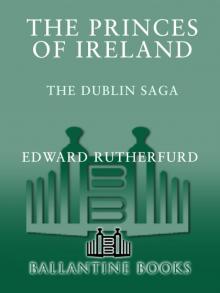 Princes of Ireland
Princes of Ireland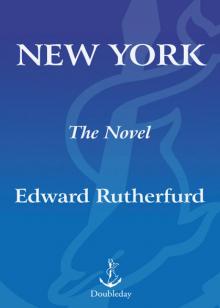 New York
New York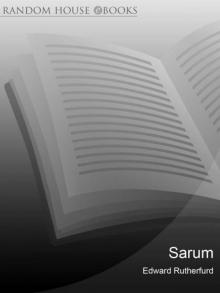 Sarum
Sarum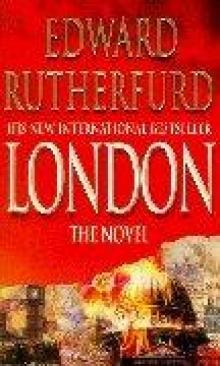 London
London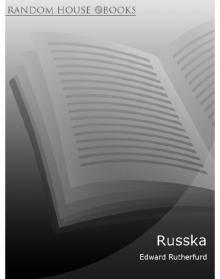 Russka: The Novel of Russia
Russka: The Novel of Russia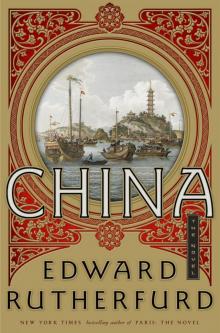 China
China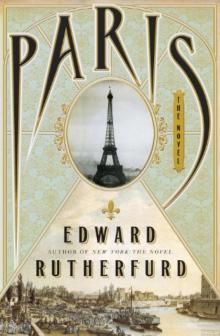 Paris
Paris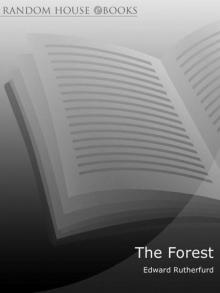 The Forest
The Forest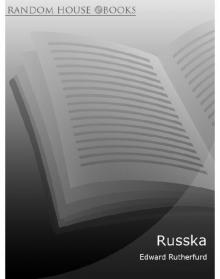 Russka
Russka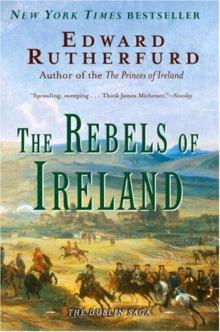 The Rebels of Ireland: The Dublin Saga
The Rebels of Ireland: The Dublin Saga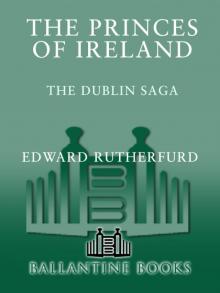 The Princes of Ireland
The Princes of Ireland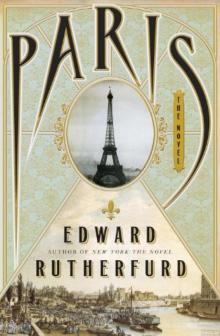 Paris: The Novel
Paris: The Novel